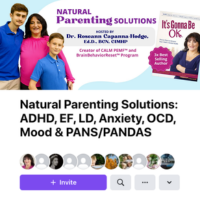If your child has trouble identifying letters, with phonics, or in reading, it is time to consider whether they have Dyslexia. Reading, one of the most neurologically complex tasks a person will learn, involves auditory and visual systems, as well as cognitive processing, memory, and attention which all must work simultaneously. Children often struggle with reading, but if they show one of the signs of Dyslexia, then here are ten ways to help your dyslexic child.
1) Get a Dyslexia Evaluation
Getting a formal evaluation is the first step toward helping a child who struggles with reading, either phonics or comprehension. Moreover, early intervention is often the key to helping your child long term. Skilled evaluators use well-developed measures to identify specific phonetic and language-based deficits as early as possible, such as the CTOPP-2, WADE, TILLS, Test of Phonological Awareness, LAC-3, etc. If, despite receiving an intervention, your child still lags behind their peer group, obtaining an evaluation can be critical to future success. The sooner an evaluator identifies specific deficits, the sooner targeted instruction can help your child read with greater fluency.
While some public schools evaluate children appropriately, others don’t train their staff well enough to identify children with reading disorders or Dyslexia. A comprehensive evaluation should look at a child’s cognitive skills, attention, memory, oral language, phonological awareness, phonological memory, rapid naming, specific phonetic skills, and decoding, reading, and comprehension at the word, sentence, and passage level, as well as spelling. A private evaluation should assess all these areas plus have concrete recommendations about the appropriate program, instructional methods, goals, and accommodations.
2) Hire an Advocate or Attorney to Help your Dyslexic Child
The process of getting assistance for your Dyslexic child can be a daunting one and sometimes you need professional assistance with getting the right supports for your child.
In order to get services through an Individualized Education Plan (IEP), there is a formal process that needs to occur. A team of professionals and yourself meet and determine if an evaluation is needed or reviews your private evaluation and then that data is reviewed and qualification as a special needs student with individual service needs is determined. If the team agrees to an IEP, then a plan with goals and objectives is put into place. An IEP means that your child gets an individualized program, which specifies that they are getting a higher level of services with measurable goals and objectives.
Whether your Dyslexic child needs a 504 Accommodation Plan or special education services through an Individualized Education Plan (IEP), an advocate or an attorney acts as your child’s voice. They know what to ask for and how to ask for it and can expedite the process because of their experience, which means you will ultimately have a happier child who is reading. They prepare you for and attend meetings with you, as well as assist with all the technical processes involved with an IEP or 504.
3) Talk to Your Child’s Teacher
Your child’s teacher provides most of the direct reading instruction and needs to know your concerns. Asking the teacher for a school meeting is important and in this blog, I share key school meeting points. Since teacher training about Dyslexia varies from state to state, some teachers might not have been exposed to the training necessary to help your child effectively so partnering with the classroom teacher can help everyone. If your child as more than one teacher, meeting with the team to share specific information about your child’s Dyslexia and how it impacts them in the classroom can help everyone achieve their needed learning goals. Although most teachers want the best for their students, some educators and districts can be resistant to working with learning disabled children. Thus, you should always follow-up with an email to document your concerns.
4) Get Extra Help at School
Once you have a formal evaluation and have created a formal learning plan for your child, either a 504 or IEP, your child’s school must provide the appropriate resources. Schools have a legal obligation to provide a free and appropriate education (FAPE) to all learners. Additionally, many children struggle with reading for a variety of reasons, and some of the generalized support already available can help Dyslexic children as well.
Supports can also be put into place before an IEP or 504 accommodation plan is put into place either informally or through a formal response to intervention plan or school child study committee. Common regular education supports include in-class help, small group instruction, reading assistance from the reading specialist within the classroom (referred to push-in) or outside of the classroom (referred to pull-out), and different types of specific assistance (comprehension, phonics, segmenting, sight words, etc) or types of programs (Wilson Reading, Read 180, etc).
5) Track Data
Formal, measurable goals offer insight into your child’s progress. Starting with baseline data and then collecting more along the way allows you to objectively measure progress.
These measurements allow you to determine whether a particular support or program is effective for your child. When a child is struggling, we want to make informed, accurate, and efficient decisions so we can support their reading. When a child is behind in reading, there is no time to waste, as reading is key to learning.
6) Get the Right Reading Program
If a particular reading program isn’t working for your child, another might be more appropriate. Depending on the way your child’s Dyslexia presents, you may need to explore more than one reading program.
Since 1917, children with Dyslexia have benefited from a structured, multisensory approach called Orton-Gillingham (OG). What is the Orton-Gillingham approach? Well, the OG approach emphasizes the connections between the sounds and letter in a very formal and sequential way. It teaches children how to decode or break words into their syllables and phonemes and how to encode or break down words orally into their syllables and phonemes to be able to spell the word. This approach works to develop automaticity and fluency at the word level. Since Orton-Gillingham is an approach and not an educational program, only highly trained individuals can administer it.
Other very effective programs have developed using O-G principals, including Wilson Reading Program and Lindamood Bell’s LIPS program, Seeing Stars, and Visualizing and Verbalizing. These research-based programs are designed to be in a language that your Dyslexic understands and can begin to learn how to read and spell. Although other programs exist, experience indicates that not all are effective.
7) Insist on a Highly Trained and Certified Tutor or Teacher
Unfortunately, most Dyslexic children aren’t identified until after third grade when direct reading instruction in the regular classroom has ended, and they are expected to read at the same pace as their peers. Remaining below grade-level in reading means they miss important information and vocabulary causing them to struggle with the workload.
As part of the IEP and/or 504 process, you need to advocate to obtain the most effective reading program for your child as well as a highly trained and certified instructor logically can get your child the right targeted help that will give them reading skills to put them on a learning trajectory with their peers. Ideally, children get the report at school but parents can choose to hire their own qualified tutor.
8) Talk to Your Child About Their Dyslexia
Children can recognize from an early age that they are different from others. Thus, starting a dialogue early empowers them by defining Dyslexia, it challenges, and its gifts.
Talking about Dyslexia’s difficulties with a licensed therapist can also alleviate its emotional toll on an individual over time. Formal counseling support helps proactively deal with minor issues before they become big ones and ensure your child or teen emotional core is secure. It can also enable you, as the parent, to find the skills necessary to help your child.
9) Optimize Their Brain
Reading programs and instructors are only one part of the learning process. You also need to support your child’s brain health. Following an anti-inflammatory diet, getting quality sleep, monitoring sleep levels, proper exercise, and making sure you are getting the right supplements and nutrients for brain health are ways to optimize the brain so processing is easier. Most Dyslexics don’t just have problems with reading, they often also have problems with anxiety, memory, attention, or executive functioning. By making their brain work better, helps make learning easier.
10) Use Neurofeedback for Dyslexia
One specific way to optimize your Dyslexic child’s brain is with neurofeedback. Children with Dyslexia can display both under-activity and overactivity in their brain wave functioning, improving connectivity helps the brain to work more efficiently. Neurofeedback training involves reinforcing the brain to self-regulate with better connectivity and timing, which results in improved learning. The areas of the brain that process phonemes, language, attention, and executive functioning can all be directly targeted to help the individual with Dyslexia.
To make an appointment with Dr. Roseann to discuss how a QEEG Brain Map or brain check or one of our clinically effective and natural therapies for Dyslexia, Learning Disability, ADHD, anxiety, depression, such as Neurofeedback and PEMF therapy can help you or your child, contact us TODAY. Live out of state or another country? We work with children, individuals, and families and remotely with at home neurofeedback and coaching.
Always remember… “Calm Brain, Happy Family™”
Are you looking for SOLUTIONS for your struggling child or teen?
Dr. Roseann and her team are all about solutions, so you are in the right place!
There are 3 ways to work with Dr. Roseann:
You can get her books for parents and professionals, including: It’s Gonna Be OK™: Proven Ways to Improve Your Child’s Mental Health, Teletherapy Toolkit™ and Brain Under Attack: A Resource For Parents and Caregivers of Children With PANS, PANDAS, and Autoimmune Encephalopathy.
If you are a business or organization that needs proactive guidance to support employee mental health or an organization looking for a brand representative, check out Dr. Roseann’s media page and professional speaking page to see how we can work together.
Dr. Roseann is a Children’s Mental Health Expert and Therapist who has been featured in/on hundreds of media outlets including, CBS, NBC, FOX News, PIX11 NYC, The New York Times, The Washington Post,, Business Insider, USA Today, CNET, Marth Stewart, and PARENTS. FORBES called her, “A thought leader in children’s mental health.”

She is the founder and director of The Global Institute of Children’s Mental Health and Dr. Roseann Capanna-Hodge. Dr. Roseann is a Board Certified Neurofeedback (BCN) Practitioner, a Board Member of the Northeast Region Biofeedback Society (NRBS), Certified Integrative Medicine Mental Health Provider (CMHIMP) and an Amen Clinic Certified Brain Health Coach. She is also a member of The International Lyme Disease and Associated Disease Society (ILADS), The American Psychological Association (APA), Anxiety and Depression Association of America (ADAA) National Association of School Psychologists (NASP), International OCD Foundation (IOCDF) International Society for Neurofeedback and Research (ISNR) and The Association of Applied Psychophysiology and Biofeedback (AAPB).
© Roseann-Capanna-Hodge, LLC 2023
Disclaimer: This article is not intended to give health advice and it is recommended to consult with a physician before beginning any new wellness regime. *The effectiveness of diagnosis and treatment vary by patient and condition. Dr. Roseann Capanna-Hodge, LLC does not guarantee certain results.













